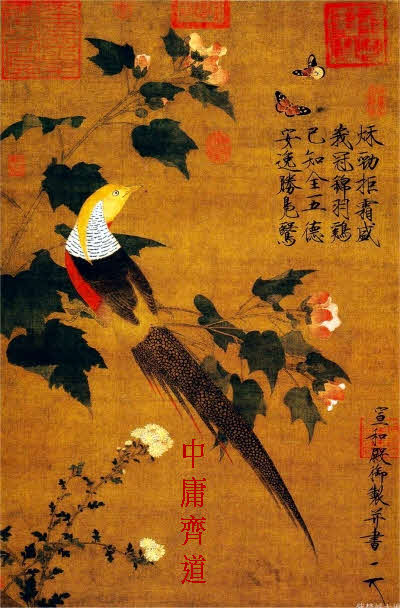中庸齊道 (Zhong Yong Chi Dao - Center Express Harmony Way) part 2

(PD) 中庸齊道 Zhong Yong Chi Dao - Center Express Harmony Way — Zhong Yong Chi Dao on Golden Pheasant
(Wording and photograph enhancements by Larry Neal Gowdy.)
Copyright ©2018 August 16, 2018
中庸齊道 Zhong Yong Chi Dao - Center Express Harmony Way — part 2
The first sentences had established the first sequence of Zhong Yong's logic.
Zhong Yong: Heavens fate, it call nature.
Zhong Yong Chi Dao: Source nascents, it call nascent-ness.
The following sentence's first word is one of the difficulties of attempting to translate ancient Chinese into English: different research sources give different meanings as well as different pronunciations. The best approach is to first glean a sentence's concept, and to then choose which English word might best fit what the original Chinese likely intended.
率 (lu) implies 'rate, ratio, proportion, frequency', but some resources state that the word is 'shuai', which implies 'lead, command: adjective = hasty, rash, frank, straightforward'. 率 is one of the words that catches the attention of individuals who are familiar with the topic, because, the word implies 'ratio' in both the Chinese and Japanese languages, and if correct, then the Zhong Yong sentence is remarkable of presenting a concept that is not found in any other known public writings.
Nevertheless, a popular interpretation is that 率 ought to be 'shuai', and given within a casual leisure of implying 'command'. It is true that casual speech may include phrases such as 'Nature rules man' and 'Nature commands man' — most everyone grasps the intention of the phrasing — but, within accuracy, Nature does not rule nor command. A simple example is of placing a little kitten in a big box. The kitten cannot walk out of the box, but the box does not rule, nor command. Similarly, Nature is as a big box, and man cannot walk out of Nature, but Nature does not rule nor command.
The concepts of 'command' and 'lead' are man-made things, of a master-slave system of social rank; the concept cannot relate to Nature itself. It is plausible that the original text was written within a casual phrasing of 'command' or 'lead' — as a general during the warring states era 'led' his troops — but the phrasing would be incorrect relative to what is real. Most known translations may have recognized the conflict of wording, and instead chose to use the word 'follow', which does make sense within the sentence if indeed the original text did wish to convey that meaning, but using 'follow' is still not harmonious with the surrounding sentences.
A man cannot 'follow' Nature, because, man is already a part of Nature. A man cannot follow what he already is.
The best answer for the word is to be found after the sentence's other words are translated.
As in the first sentence, 性 (xing) is usually given the casual definition of 'inner nature', which is generally acceptable, but for additional accuracy, 'nascent-ness' lends a depth of meaning while also giving harmony to the book's words: chi dao.
之 (zhi), again, most likely infers 'it'.
謂 (wei), also again, is best left to imply 'call'.
道 (dao) implies 'a measure word, direction, method, path, principle, reason, road, skill, Tao (of Taoism), to say, to speak, to talk, truth, way'. Within 齊道 (Qi Dao (Chi Dao)) is the pointing to the acts of 'the dao of Nature is the way and standard that Nature exists upon' and 'the dao is the way of a man to choose the way of Nature as the man's own standard'.
Normal 中庸 Zhong Yong translation: Command nature, it call way.
中庸齊道 Zhong Yong Chi Dao phrasing: Ratio nascent-ness, it call way.
The original phrasing of Zhong Yong is parallel to Zhong Yong Chi Dao, but Zhong Yong Chi Dao aims to convey deeper meanings and descriptions.
Zhong Yong general translation:
Heavens fate, it call nature.
Command nature, it call way. (The more popular translation is 'Follow nature, it call way', but the word 'follow' does not agree well with the original word, nor with the surrounding words.)
Zhong Yong Chi Dao:
Source nascents, it call nascent-ness.
Ratio nascent-ness, it call way.
Visible Creation has a base-layer that is of ratios. The observable Creation does not exist on a flat line, nor blink on and off as a binary would cause. Creation flows, Creation is curved, Creation has durations of curvatures, the curvatures interact within ratios of shapes, speeds, durations, intensities, pressures, and all others, and where the ratios harmonize, creativity nascents. That is the way of Nature.
It is reasonable that the second sentence might have been intended to be as 'Follow nature, call it way' because the average person 2,600 years ago would likely not grasp what ratios imply, and so, casual speech would be more effective by using the idioms known to the era and culture.
Permitting the second sentence to speak of ratio nascent-ness (or a parallel term) is important for retaining harmony amongst latter sentences. If the sentence were permitted to remain as 'Command nature' or 'Follow nature', then the attributes given to quality individuals would cause the whole of the book's message to become conflicting and incoherent. Zhong Yong Chi Dao strives to express the concepts within Zhong Yong, but while also retaining a harmony between the concepts.